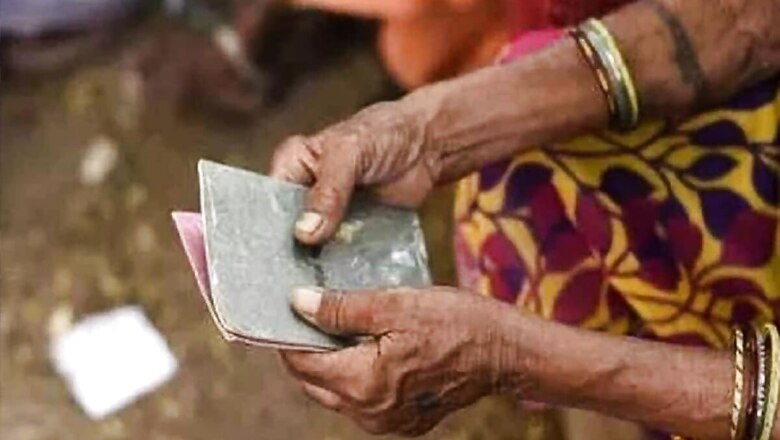
views
Yet again, the doorstep delivery of ration has become a hot topic in the national capital after it was allegedly halted by the Centre for the second time since March. But this fight is not new rather it has been a subject of conflict between the Aam Aadmi Party government in Delhi and the BJP-led Centre since 2018.
The doorstep delivery of ration is a flagship scheme of the Arvind Kejriwal government. Even before entering politics, Kejriwal had worked at the grassroots level and exposed PDS scams in the city.
Delhi has around 72 lakh PDS beneficiaries who receive ration through a network of more than 2,000 fair price shops. The 17.77 lakh ration card holding families in Delhi are divided into three categories — 15.12 lakh priority households (PR), 1.73 lakh priority state households (PRS), and 68,468 Antyodaya Anna Yojana (AAY) families.
As per the doorstep delivery scheme, beneficiaries, who currently have to go to the PDS shops to collect the ration, will get wheat flour, rice and sugar delivered to their homes.
The beneficiaries who will sign up for the scheme will be notified in advance through SMS about the delivery. As per the scheme notification, food grains will be collected from Food Corporation of India godowns by empanelled agencies. The food grains will be sent to mills for processing, wheat into flour, and will be packed. Rice too will be cleaned and packed. These will be first dropped at the PDS shops and from there to the doorsteps of the beneficiaries.
Currently, the PR and PRS beneficiaries are entitled to 5 kg of food grains per month, 4 kg of wheat and 1 kg of rice. For AAY households, it is 25 kg wheat, 10 kg rice and 1 kg sugar. The wheat cost Rs 2 per kg while the price of rice is fixed at Rs 3 per kg. The rate of sugar is Rs 13.50 per kg.
While the Union government is responsible for the procurement, storage, transportation and allocation of food grains to the States, the State governments have to identify the beneficiaries and deliver the food grains.
Last week, Kejriwal accused Delhi Lt Governor Anil Baijal of rejecting the AAP government’s proposal of the doorstep delivery of ration, citing two reasons – the Centre is yet to approve the scheme and an ongoing court case.
This was the second time this year that the scheme has been stalled due to differences between the Delhi and Central governments.
Here is a timeline of clashes between the Centre and Delhi governments over the scheme:
March 2018: The Delhi Cabinet decided to ensure doorstep delivery of monthly ration to beneficiaries. Within days, the AAP alleged that the LG had rejected the proposal. However, the L-G’s office said that Anil Baijal did not reject the proposal but advised that it should be referred to the Centre with full details.
July 2018: The Supreme Court clipped the powers of the LG and ruled that the LG should act on the advice of the elected government. Within days, Kejriwal overruled all objections and approved the doorstep delivery of rations and decided to name the scheme ‘Mukhya Mantri Ghar Ghar Ration Yojana’.
Later that month, the AAP government said that the bureaucrats were pushing for the Centre’s opinion before the rollout. The proposal was sent to the legal department and could not be implemented.
February 2020: It was part of Kejriwal’s promise in the Assembly polls. After getting elected, the government made it a priority.
July 2020: The Delhi Cabinet cleared ‘Mukhyamantri Ghar Ghar Ration Yojana’ for doorstep delivery of ration.
February 2021: The scheme was notified. It was decided that it will be launched on March 25.
March 2021: The GNCTD Bill, 2021 was passed in Parliament. It made the LG the supreme power in Delhi again. Days before the implementation of the scheme, the Centre objected to the name of the scheme. The Delhi Cabinet approved a nameless scheme for the doorstep delivery of ration.
Also, the Centre said the food grains being provided under National Food Security (NFS) Act 2013 cannot be used to run any State-specific scheme. Under the NFS Act, highly subsidised foodgrains are allotted to the States. Also, any change in the delivery mechanism requires an amendment in NSF Act, which can be done only by Parliament.
May 2021: After accepting all suggestions of the central government, the Delhi government said it had sent the file to the LG for his final approval. The immediate rollout of the scheme was scheduled. However, the LG has returned the file saying the scheme cannot be implemented in Delhi.
June 2021: The AAP government alleged that the LG has rejected the file for implementation of the scheme citing the same two reasons – the Centre is yet to approve the scheme and an ongoing court case. The petition is scheduled to be heard on August 20. The LG office said the file was returned for reconsideration since the proposal seeks to change the method of distribution, it would mandatorily require the prior approval of the Union Government.
Read all the Latest News, Breaking News and Coronavirus News here.
















Comments
0 comment